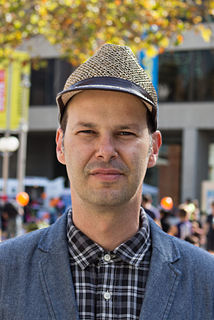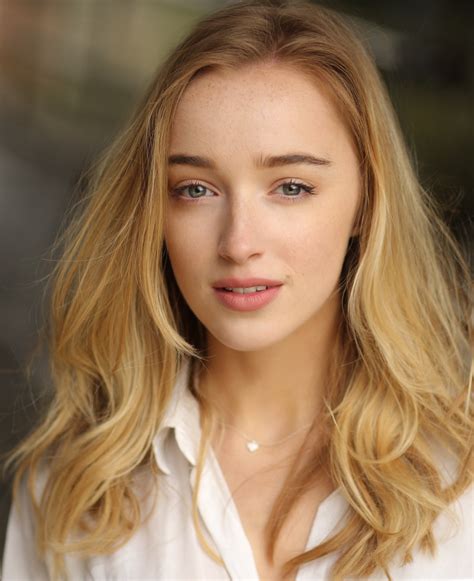A Quote by Karen Abbott
When Gypsy was older, after she became Gypsy Rose Lee, I think she was both proud and slightly ashamed of her Seattle roots. She worked very hard to rid her voice of any trace of a local accent, cultivating an affected way of speaking that sounded as if she pinned the ends of her words.
Related Quotes
Her sister [June Havoc] said the musical portrayed who Gypsy [Rose Lee] wanted to be before the burlesque thing happened she wanted to be this beautiful, romantic person with dreams. So Gypsy told the story of her life as she wished she'd lived it: embellishing, softening the edges, eliminating certain things altogether.
Imagine the first Burmese "giraffe woman"; she was probably a local icon in her village in the way she put the rings around her neck to sell her craft. Then she became a celebrity, so all of the wannabes started following her in that uncomfortable and unhealthy trend. But is that so different from Pamela Anderson? I don't think so.
She sat leaning back in her chair, looking ahead, knowing that he was as aware of her as she was of him. She found pleasure in the special self-consciousness it gave her. When she crossed her legs, when she leaned on her arm against the window sill, when she brushed her hair off her forehead - every movement of her body was underscored by a feeling the unadmitted words for which were: Is he seeing it?
I was raised by a single mom who had to put herself through school while looking after two kids. And she worked hard every day and made a lot of sacrifices to make sure we got everything we needed. My grandmother, she started off as a secretary in a bank. She never got a college education, even though she was smart as a whip. And she worked her way up to become a vice president of a local bank, but she hit the glass ceiling. She trained people who would end up becoming her bosses during the course of her career.
She once said, 'I'm really a little prudish, which people may think incongruous'. I take a prudish point of view on certain films, books, and trends. Then, I pull myself up short and ask myself how Gypsy Rose Lee could possibly be this way.I thought that quote was so telling, a key insight into the way she so carefully separated who she was from her meticulous creation.
Eventually she came. She appeared suddenly, exactly like she'd done that day- she stepped into the sunshine, she jumped, she laughed and threw her head back, so her long ponytail nearly grazed the waistband of her jeans. After that, I couldn't think about anything else. The mole on the inside of her right elbow, like a dark blot of ink. The way she ripped her nails to shreds when she was nervous. Her eyes, deep as a promise. Her stomach, pale and soft and gorgeous, and the tiny dark cavity of her belly button. I nearly went crazy.
It was a great challenge to reconstruct Gypsy Rose Lee life, and my interviews with her sister [June Havoc] proved invaluable. It's not often that writers have access to living primary source material; this was the only person who experienced life on the vaudeville circuit with Gypsy during the 1920s, and who saw her perform at Minsky's Burlesque in the 1930s. She knew things that no one else could ever possibly know.
In a way, her strangeness, her naiveté, her craving for the other half of her equation was the consequence of an idle imagination. Had she paints, or clay, or knew the discipline of the dance, or strings, had she anything to engage her tremendous curiosity and her gift for metaphor, she might have exchanged the restlessness and preoccupation with whim for an activity that provided her with all she yearned for. And like an artist with no art form, she became dangerous.
I'll just be your brother from now on." he said, looking at her with a hopeful expectation that she would be pleased, which made her want to scream that he was smashing her heart into pieces and he had to stop. "That's what you wanted, isn't it?" It took her a long time to answer, and when she did, her own voice sounded like an echo, coming from very far away. "Yes," she said, and she heard the rush of waves in her ears and her eyes stung as if from sand or salt spray. "That's what I wanted.
She was beautiful, but not like those girls in the magazines. She was beautiful, for the way she thought. She was beautiful, for the sparkle in her eyes when she talked about something she loved. She was beautiful, for her ability to make other people smile, even if she was sad. No, she wasn't beautiful for something as temporary as her looks. She was beautiful, deep down to her soul. She is beautiful.
She stared at herself in the mirror. Her eyes were dark, almost black, filled with pain. She'd let someone do that to her. She'd known all along she felt things too deeply. She became attached. She didn't want a lover who could walk away from her, because she could never do that - love someone completely and survive intact if her left her.



























